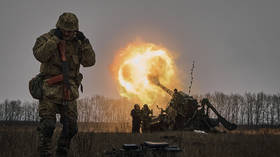Ukrainian troops finish crash course on US ‘tank killers’
The first Bradley battalion has completed its training in Germany, the Pentagon announced
The first group of Ukrainian soldiers has completed their “battalion combined-arms training” at the US Army Grafenwoehr training area in Germany, the Pentagon told reporters on Friday. The training focused on using M2 Bradley armored vehicles, which were promised in early January and began to arrive in Germany this week.
“Approximately 635 Ukrainians completed the approximately five-week period of instruction,” Pentagon spokesman General Pat Ryder said in a statement. The training included “basic soldier tasks like marksmanship, along with medical training, squad, platoon and company training, and a battalion force-on-force exercise,” he added.
The second group began training at the start of February, Ryder said, while another 700 Ukrainians were being taught how to operate M109 Paladin self-propelled artillery. Another 900 or so Ukrainians will start training on field artillery and M1126 Stryker armored vehicles next week.
Located in eastern Bavaria, Grafenwoehr was originally built by Imperial Germany ahead of the First World War and expanded by the Wehrmacht in 1938 to practice Blitzkrieg tactics. The US military occupied it in 1945 and has operated it ever since.
The Pentagon began training Ukrainian forces at Grafenwoehr last May, and expanded the program in December. The program has not been limited to Europe, however; an unspecified number of Ukrainians were also flown over to Fort Sill in Oklahoma, to be trained on Patriot missile systems.
Meanwhile, the first batch of Bradleys arrived at the US Army depot near Mannheim, Germany on Friday. A ship with 60 or so vehicles left Charleston, South Carolina three weeks ago, shortly after the Pentagon’s announcement it would send the “tank killers” to Kiev. Since then, President Joe Biden has also promised Ukraine a batch of M1 Abrams main battle tanks, though they may not arrive before 2024.
Moscow has warned the US and its allies that further shipments of weapons to Kiev only delay the inevitable and risk direct confrontation. Washington and NATO insist they are not a party to the conflict, though they have sent over $100 billion worth of weapons and ammunition to Ukraine over the past 12 months.
You can share this story on social media:








Comments are closed.